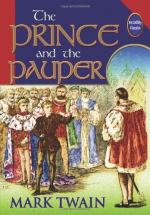Bet and Nan were fifteen years old—twins. They were good-hearted girls, unclean, clothed in rags, and profoundly ignorant. Their mother was like them. But the father and the grandmother were a couple of fiends. They got drunk whenever they could; then they fought each other or anybody else who came in the way; they cursed and swore always, drunk or sober; John Canty was a thief, and his mother a beggar. They made beggars of the children, but failed to make thieves of them. Among, but not of, the dreadful rabble that inhabited the house, was a good old priest whom the King had turned out of house and home with a pension of a few farthings, and he used to get the children aside and teach them right ways secretly. Father Andrew also taught Tom a little Latin, and how to read and write; and would have done the same with the girls, but they were afraid of the jeers of their friends, who could not have endured such a queer accomplishment in them.
All Offal Court was just such another hive as Canty’s house. Drunkenness, riot and brawling were the order, there, every night and nearly all night long. Broken heads were as common as hunger in that place. Yet little Tom was not unhappy. He had a hard time of it, but did not know it. It was the sort of time that all the Offal Court boys had, therefore he supposed it was the correct and comfortable thing. When he came home empty-handed at night, he knew his father would curse him and thrash him first, and that when he was done the awful grandmother would do it all over again and improve on it; and that away in the night his starving mother would slip to him stealthily with any miserable scrap or crust she had been able to save for him by going hungry herself, notwithstanding she was often caught in that sort of treason and soundly beaten for it by her husband.
No, Tom’s life went along well enough, especially in summer. He only begged just enough to save himself, for the laws against mendicancy were stringent, and the penalties heavy; so he put in a good deal of his time listening to good Father Andrew’s charming old tales and legends about giants and fairies, dwarfs and genii, and enchanted castles, and gorgeous kings and princes. His head grew to be full of these wonderful things, and many a night as he lay in the dark on his scant and offensive straw, tired, hungry, and smarting from a thrashing, he unleashed his imagination and soon forgot his aches and pains in delicious picturings to himself of the charmed life of a petted prince in a regal palace. One desire came in time to haunt him day and night: it was to see a real prince, with his own eyes. He spoke of it once to some of his Offal Court comrades; but they jeered him and scoffed him so unmercifully that he was glad to keep his dream to himself after that.
He often read the priest’s old books and got him to explain and enlarge upon them. His dreamings and readings worked certain changes in him, by-and-by. His dream-people were so fine that he grew to lament his shabby clothing and his dirt, and to wish to be clean and better clad. He went on playing in the mud just the same, and enjoying it, too; but, instead of splashing around in the Thames solely for the fun of it, he began to find an added value in it because of the washings and cleansings it afforded.




